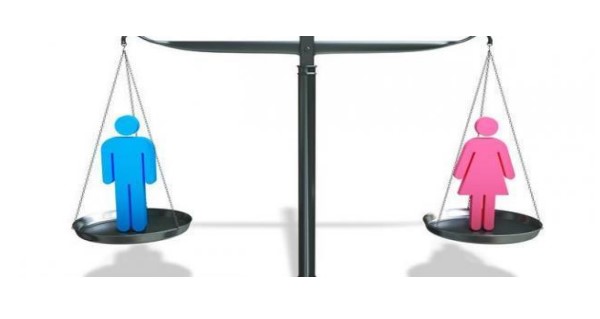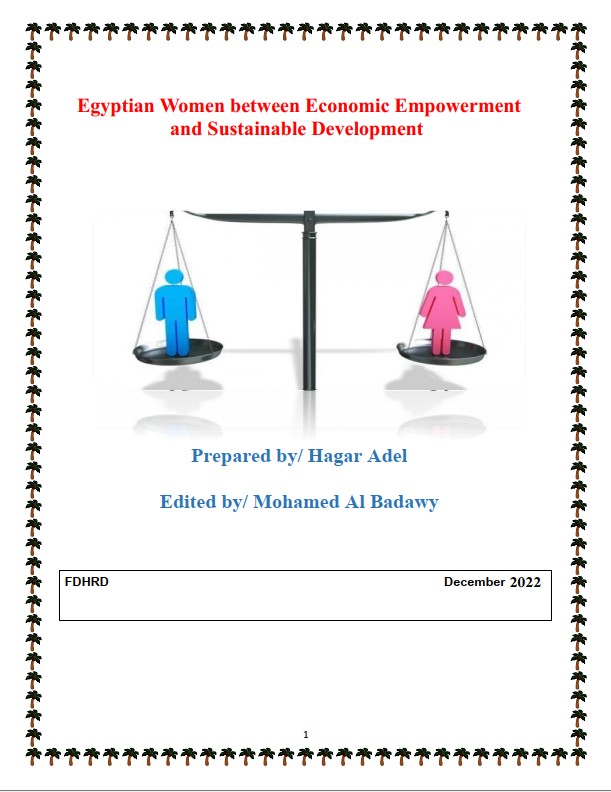Press Release
………………………………………………………
Today, Tuesday, December 20, 2022, The Forum for Development and Human Rights Dialogue (FDHRD) issues its report on Egyptian women between Economic empowerment and sustainable development, which addresses the issue of women’s economic empowerment and their participation in the labor market. This is one of the important issues that need to be highlighted to understand its urgency not only for women’s lives, and achieving gender equality, but also on the economies of countries and the world in general,
Empowering women economically means to give them a greater role in societies, and provide them with real chances to contribute to raising the Domestic Product. It is to provide a better life for them and their families, as well. Economic empowerment is an essential element of the progress of societies and combating poverty, especially in governorates.
The report highlighted the state’s efforts over the past 8 years, which have empowered women in all fields as that is the way to build the society and generations. Therefore, they must have a political and economic voice, and opportunities and support to overcome all obstacles to serve their country.
Also, the report addresses some points related to women’s empowerment, especially in Egypt, which are:
- Definition of women’s empowerment
- Importance of women’s empowerment
- Principles of women’s empowerment
- Indicators of women’s empowerment
- Obstacles of women’s empowerment
- Egyptian efforts to empower women
- Recommendations
The report also referred to the most important channels, through which the state can empower women, and at the same time reduce the gender disparity, affecting economic growth and development, as the following:
- Higher education rates among women are associated with lower birth rates, through awareness of the importance of birth control, as well as increasing savings rates in households.
- Women’s ability to make economic decisions within the family is associated also with the channeling of a larger portion of spending on children’s basic needs, such as education and health.
- Through this impact on the rates of education and savings, women’s empowerment and better gender equality rates in the long run positively affect the characteristics of labor supply, productivity and investment rates.
- The empowerment of women helps essentially to benefit from productive capacities that already exist in society but aren’t being utilized, which means more and greater efficiency in exploiting the available elements of production.
The report also confirmed that Egyptian women have received great attention from the state, which believed in the importance of the role of women in society as an essential pillar to the state. They are also responsible for raising future generations. Therefore, the Egyptian state was keen on integrating the concepts of gender equality, and women’s empowerment in educational curricula at different stages, in order to spread culture and rational thought to empower women, as well as attention to training and building their capacities, which is one of the most important mechanisms for implementing the plan to build the Egyptian person. This is one of the strategic objectives of the Egyptian state, which seeks to qualify all government cadres.
While these tangible achievements are significant, more can be looked forward to by adopting some recommendations:
- Develop policies to ensure that the private sector adheres to adequate representation of women on the boards of directors of companies, paying attention to the diversity of economic sectors in the governorates, attracting industries that can create direct and indirect opportunities across value chains to employ women, and activating policies and procedures that encourage women to establish their own projects.
- Expand business development services for women, applying one-stop shop systems for women investors, expanding the application of experiences of establishing economic activity cooperatives directed to women, providing financial services for initiatives to encourage savings, and collective lending for women.
- Provide a safe and decent work environment, public places and safe means of transportation, address conscious and unconscious bias, especially in the private sector, and develop investment policies and management and financing systems.
- Achieve more protection of the rights of working women and provide support services by activating laws that protect working women and guarantee their rights with regard to working hours and vacations, and equality with males in pay, especially in the private sector.
- Take measures to ensure that Human resources’ policies and regulations adhere to the inclusion of the pursuit of gender equality in all employment relations, including recruitment and training, promotion, salaries, access to benefits and termination of service, and should also take into account maternity benefits, grievance mechanisms and actions to combat workplace harassment, and the provision of auxiliary services to working women in accordance with Article 11 of the Constitution, such as: Providing childcare services (time for breastfeeding children and nurseries), and achieving protection for them inside and outside the work environment.
- Enhance women’s work in the agricultural sector, expanding projects that facilitate women’s employment in different locations in the value chains of agricultural production, including agricultural processing, and providing sources of financing for women working in the agricultural sector in all its activities to expand their role in it.
- Not neglect the role of women working inside the home and in the informal sector, by developing laws and procedures that help preserve the rights of women working in the informal sector, conducting studies on the economic contribution of women’s unpaid work within the home, as a basis for spreading a culture that values this work, and applying flexible operating systems and working from home to give women the option to combine their work and family role, protect domestic workers, and legalize their status to ensure their rights.
- Raise community awareness about the need to appreciate and respect all the work done by working women inside their homes and caring for their families, and outside it in the labor market, considering that both roles are very important.
For his part, Saeed Abdel Hafez, Chairman of the FDHRD, stressed that empowering women economically is giving a greater role to women in societies and providing them with real opportunities, also women’s economic participation will contribute to raising the GDP, providing a better life for them and their families, which is an important element of the progress of societies and in the fight against poverty, especially in the governorates.
While Hagar Adel, a researcher at FDHRD, stated that empowering woman in the economy and closing gender gaps in the labor market is key to achieving the Sustainable Development Goals 2030. When more women work, economies grow.








